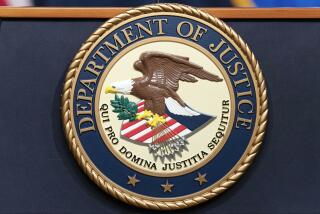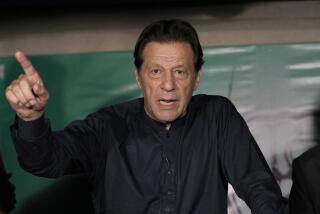Pakistani court rules in favor of suspected ringleader in 2008 Mumbai attacks
- Share via
Reporting from Islamabad, Pakistan, and New Delhi — Pakistan’s high court ruled Tuesday that authorities did not have enough evidence to arrest a firebrand Islamic cleric suspected of masterminding the deadly attacks on the Indian city of Mumbai. The ruling is likely to anger India’s government at a time when the two rival countries seek a thaw in relations.
Hafiz Saeed founded Lashkar-e-Taiba, the Pakistani militant group blamed for the string of assaults on luxury hotels, a railway station and other targets in Mumbai that killed 166 people in 2008. Considered one of India’s most wanted men, he was freed from house arrest in June by a Pakistani court in Lahore that ruled that authorities had failed to link him to the Mumbai attacks or to any terrorist group.
Pakistan’s Supreme Court ruling Tuesday upheld the lower court decision. Saeed currently heads a charity organization, Jamaat-ud-Dawa, which is regarded by Western leaders as a front for Lashkar-e-Taiba. Saeed’s followers say Jamaat-ud-Dawa has no ties to any terrorist group and instead focuses on the construction of schools and clinics and other humanitarian work.
Indian officials expressed dismay over the decision but also resignation. Many in India see a long pattern of Pakistan arresting prime terrorism suspects only to quietly release them, especially if they have ties to Pakistan’s security establishment.
“I am sure everybody in this country will share the same sense of disappointment on this development,” Indian Foreign Secretary Nirupama Rao said at a news briefing, “especially when we regard Hafiz Saeed as one of the masterminds of the Mumbai terror attacks, and he has openly urged jihad against India.”
It remains to be seen what effect the ruling might have on talks between India and Pakistan that are aimed at resuming a dialogue that was sidetracked by the Mumbai attacks.
Indian Prime Minister Manmohan Singh and Pakistani Prime Minister Yusaf Raza Gilani have recently cited the need to forge a new level of trust between the two nuclear-armed states. The countries’ foreign ministers are expected to meet in July in Islamabad, the Pakistani capital.
Salman Haider, an analyst and former Indian foreign secretary, said the decision could threaten both countries’ recent movement toward grappling with the climate of mistrust.
Saeed “is very, very provocative in India when he comes out with these campaigns against this country,” Haider said. “We have to find a solution, how to deal with this man.”
Pakistani authorities had arrested Saeed twice before in connection with terrorist attacks on Indian soil: in 2001 after an attack on the Indian parliament and in 2006 after train bombings in Mumbai that killed about 200 people. In both cases, he was placed under house arrest for a short time before being released.
With support from Pakistan’s spy agency, Inter-Services Intelligence, Saeed formed Lashkar-e-Taiba about 20 years ago to fight Indian rule in a portion of the Himalayan region of Kashmir. The U.S. and other Western governments worry that Lashkar-e-Taiba’s mission has expanded and now includes Western targets.
David Coleman Headley, a Pakistani American convicted in the United States of conspiring to commit terrorism, had been working with Lashkar-e-Taiba operatives to scout targets for the Mumbai attacks, including locations frequented by Westerners. Six Americans were among those killed.
Rodriguez reported from Islamabad and Magnier from New Delhi.
More to Read
Sign up for Essential California
The most important California stories and recommendations in your inbox every morning.
You may occasionally receive promotional content from the Los Angeles Times.










